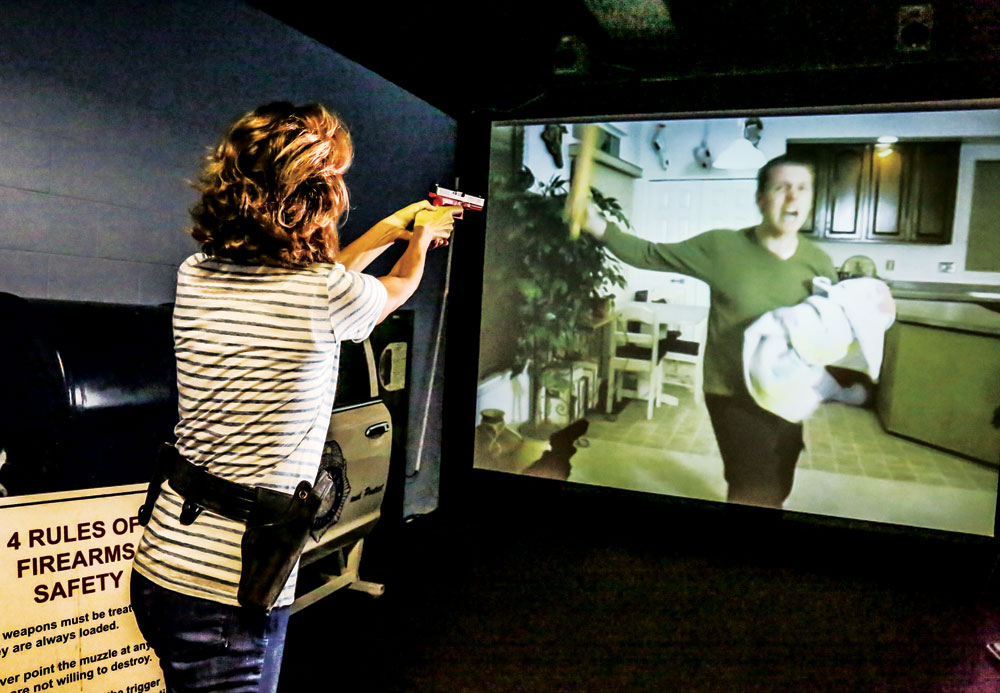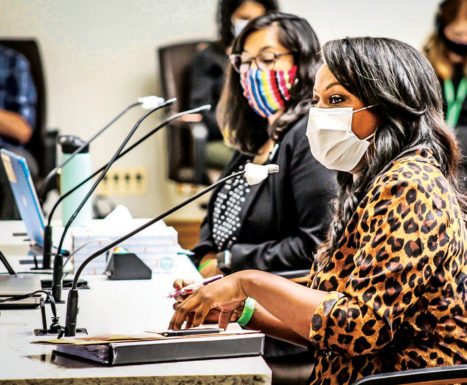
For a 2016 Front Porch story about police officer training on when shooting would or would not be an acceptable response, our writer, with a training gun, participated in a scenario of a man approaching with a bat while holding a baby.
With Gov. Polis’ signing of the Law Enforcement Accountability and Integrity Act on June 19, Colorado became the first state in the nation to implement comprehensive police reform since the brutal killing of George Floyd ignited nationwide protests. The sweeping measures (see inset) have brought Colorado into the national spotlight as a possible model for other states. Rep. Leslie Herod, who represents House District 8, was one of the bill’s sponsors, and explains how legislators were able to move so quickly on reform.

Legislation sponsor Rep. Leslie Herod says, “It would not have happened without the voice of the protesters. Protest does lead to policy change.”
“I have been working on these issues since I heard about what happened to De’Von Bailey and the lack of justice that his family received, and Elijah McClain’s death, it just made the calls for change even louder,” says Herod, reflecting on the August 2019 killings of two young Black men—Bailey, shot in the back while fleeing Colorado Springs police and McClain, who died after Aurora police placed him in a carotid control hold. The new law specifically bans both of these actions.
Strong bipartisan and law enforcement (Colorado Fraternal Order of Police and the Colorado Association of Chiefs of Police) support for the legislation made for swift passage in both houses. Herod says demonstrators demanding police reform made all the difference. “The law enforcement lobby was not supportive of my initial request for fleeing felon [the measure that bans the use of deadly force if someone is running away] or to change the use of force standards in Colorado; we met in November to talk about just that and I was told that change didn’t need to happen, we didn’t need any state laws to regulate or oversee what’s happening with law enforcement at the local level.”
“It wasn’t until we had the protest movement coming from the people that we were able to have the political momentum to get something passed through the general assembly,” Herod says.
According to Colorado Public Radio, Colorado ranks fifth in the nation for fatal law enforcement shootings, and time will tell whether these reforms lower officers’ propensity to discharge their weapons. When asked if she sees a connection between police tendency to use deadly force and high gun ownership (35% of Coloradans own guns), Herod says “I do believe that there is some synergy with how quickly people are willing to take somewhere else’s life and we should definitely be concerned about that. I do believe in principle in gun control, absolutely.”
Recruiting new law enforcement, and especially ensuring a racially and ethnically diverse pool of recruits, has long been a challenge in Colorado and nationally. While all of the negative press and greater oversight suggest that enlisting new candidates may continue to be difficult for some time, Herod hopes promoting integrity will lead to more children wanting to grow up to become police officers. “I believe people are not trying to be law enforcement officers because they see law enforcement officers killing people in our communities, on their social media feed on a regular basis.”
Herod says she will look to the community to guide her moving forward. “The work doesn’t stop,” she says. She and other legislators are exploring banning ketamine as well as promoting greater citizen oversight.
Most of the Act’s provisions go into effect in 2020, with a few measures taking effect in 2023. No additional funds are included to implement reform, which Herod says can be achieved by shifting priorities within departments.
The Law Enforcement Integrity Act:
- Mandates body cameras, makes video of police misconduct publicly available (to public within 21 days, to victim’s family 72 hours prior to public release), and holds officers accountable when they fail to record.
- Requires data collection and public reporting on policing including demographic data of individuals encountered, type and severity of force used, civilian searches, forced entries into homes, and the unholstering and discharging of a firearm.
- Reins in use of deadly force by officers: (1) outlaws chokeholds; (2) outlaws deadly force against someone fleeing the police who does not pose an immediate risk; (3) outlaws the use of deadly force to arrest people for minor offenses and non-violent offenses; and (3) requires non-violent means before resorting to any force.
- Requires officers to intervene to stop excessive force. Failure to intervene by an officer is a criminal offense.
- Decertifies bad officers.
- Creates a publicly available database to prevent rehiring of officers who are found untruthful, terminated for cause, or decertified.
- Ends qualified immunity of officers found liable. Victims of police misconduct can bring a lawsuit for violation of their constitutional rights.
- Protects protesters from police use of tear gas and projectiles: prohibits shooting rubber bullets indiscriminately into a crowd and targeting at someone’s head, torso, or back. Prohibits using tear gas without warning, time to disperse, and a route to disperse.
- Authorizes attorney general lawsuits against bad police departments to force change and bring criminal charges against officers for violations of POST standards.



How about enhanced penalties for assaulting police officers, looting, attempted arson, inciting a riot, damaging public property, trespassing, and disturbing the peace? Rigorous enforcement would reduce confrontations, reduce property damage, and save lives.